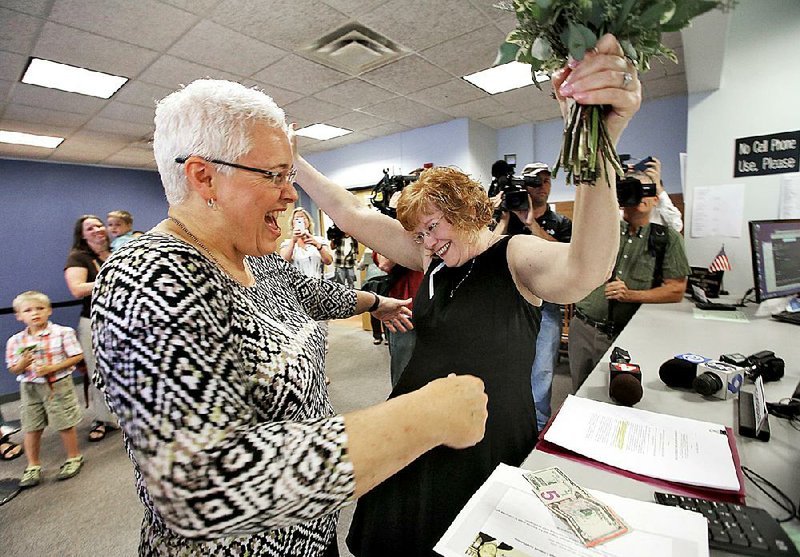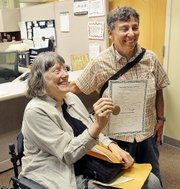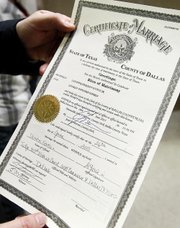WASHINGTON -- Same-sex couples have a constitutional right to marry nationwide, the U.S. Supreme Court said Friday in a historic ruling that caps the biggest civil-rights transformation in half a century.
Voting 5-4, the justices said states lack any legitimate reason to deprive gay couples of the freedom to marry, paving the way for gay weddings to the last 14 states where they were still banned. Justice Anthony Kennedy wrote the opinion for the majority.
"The right to marry is a fundamental right inherent in the liberty of the person. Couples of the same sex may not be deprived of that right and that liberty," Kennedy wrote.
"No union is more profound than marriage, for it embodies the highest ideals of love, fidelity, devotion, sacrifice and family," he wrote. "In forming a marital union, two people become something greater than once they were."
Justices Ruth Bader Ginsburg, Stephen Breyer, Sonia Sotomayor and Elena Kagan joined Kennedy's opinion without adding any separate comments.
Chief Justice John Roberts and Justices Antonin Scalia, Clarence Thomas and Samuel Alito dissented, with each writing a separate opinion. Roberts read a summary of his dissent from the bench for the first time in his 10 years on the court.
Roberts wrote that the gay couples "make strong arguments rooted in social policy and consideration of fairness." But, he said, "under the Constitution, judges have power to say what the law is, not what it should be."
The Supreme Court case involved 31 people from Ohio, Michigan, Tennessee and Kentucky. A federal appeals court had upheld gay-marriage bans in those states, saying changes to marriage laws should come through the political process, not the courtroom.
Kennedy rejected that reasoning, saying the democratic process must give way to the Constitution.
"The dynamic of our constitutional system is that individuals need not await legislative action before asserting a fundamental right," he wrote. "The nation's courts are open to injured individuals who come to them to vindicate their own direct, personal stake in our basic charter."
Kennedy said same-sex marriage bans violated two guarantees protected by the Constitution's 14th Amendment: the fundamental right to marry and the right to equal protection.
Gay couples "ask for equal dignity in the eyes of the law," Kennedy wrote. "The Constitution grants them that right."
His 28-page opinion said marriage was an institution that had "evolved over time."
"Changed understandings of marriage are characteristic of a nation where new dimensions of freedom become apparent to new generations, often through perspectives that begin in pleas or protests and then are considered in the political sphere and the judicial process," he wrote.
Kennedy said people with religious objections "may continue to advocate with utmost, sincere conviction that, by divine precepts, same-sex marriage should not be condoned."
In his dissent, Roberts said supporters of gay marriage should "celebrate" the ruling and the "opportunity for a new expression of commitment to a partner."
"But do not celebrate the Constitution," he wrote. "It had nothing to do with it."
He called the majority opinion "an act of will, not legal judgment."
Scalia and Thomas joined Roberts's opinion and also wrote separately. Scalia called the ruling a "threat to American democracy."
"Today's decree says that my Ruler, and the Ruler of 320 million Americans coast-to-coast, is a majority of the nine lawyers on the Supreme Court," Scalia wrote.
He also mocked the soaring language used by Kennedy.
"The opinion is couched in a style that is as pretentious as its content is egotistic," Scalia wrote of his colleague's work. "Of course the opinion's showy profundities are often profoundly incoherent."
Alito said the ruling "will be used to vilify Americans who are unwilling to assent to the new orthodoxy." He faulted the majority for equating gay-marriage bans to the laws that once barred interracial marriages.
The high court ruling means that "our love is equal," Jim Obergefell of Ohio, the lead plaintiff in the case, said outside the court building. "The four words etched onto the front of the Supreme Court, 'Equal Justice Under Law,' apply to us, too."
Obergefell became the lead plaintiff in the case, Obergefell v. Hodges, after seeking to have his name on the death certificate of his domestic partner of two decades, John Arthur. Obergefell and Arthur married on an airport tarmac in Maryland in 2013 just months before Arthur's death.
Other people seeking marriage rights in the case included Michigan residents April DeBoer and Jayne Rowse, nurses who have adopted four children, two of them with special needs.
Immediately after the ruling, President Barack Obama called Obergefell.
"Your leadership on this issue, you know, has changed the country," Obama told Obergefell, who was in the courtroom for Friday's announcement.
In a separate statement at the White House, Obama said, "This ruling will strengthen all of our communities by offering to all loving same-sex couples the dignity of marriage across this great land."
Meanwhile, many Republicans expressed disappointment, including House Speaker John Boehner of Ohio.
"The Supreme Court disregarded the democratically enacted will of millions of Americans by forcing states to redefine the institution of marriage," Boehner said.
The Supreme Court had previously hinted at support for gay marriage in a 2013 decision that struck down part of a law denying federal benefits for same-sex spouses. At the time, only 12 states had gay marriage.
The justices reinforced that perception of support by repeatedly letting pro-marriage lower court orders take effect. Those orders increased the number of states where gays could wed to 36, plus the District of Columbia.
Almost 400,000 same-sex couples already have married in places where it is legal, and an estimated 70,000 more now will wed in the new states, according to research by the UCLA School of Law's Williams Institute.
Friday's ruling doesn't resolve all legal questions about gay rights. Civil-rights advocates are still trying to win anti-discrimination protections, both at the federal level and in the dozens of states where people can be fired or denied housing because of sexual orientation.
But experts said the ruling is a legal landmark, on par with the 1967 Supreme Court decision that guaranteed interracial couples the freedom to wed. It punctuates a period of sweeping change in the rights of gays, coming only 11 years after Massachusetts became the first state to allow same-sex marriages.
A partylike atmosphere developed outside the court in the hours after the ruling. Gay-marriage supporters cheered, sang songs and took pictures of themselves.
"This means finally equality for not only the entire gay community but for myself as well," said Dan Fitzgerald, a 19- year-old gay man from Washington and student at American University.
Information for this article was contributed by Greg Stohr, David McLaughlin, Billy House, Rachel Adams-Heard and Esme E. Deprez of Bloomberg News and by Adam Liptak, Julie Hirschfeld Davis and Nicholas Fandos of The New York Times.
A Section on 06/27/2015





